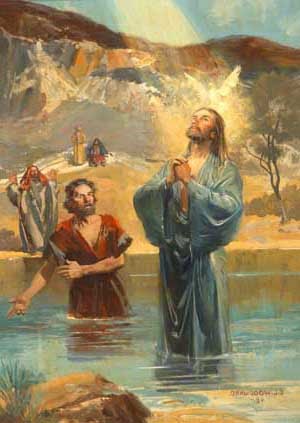The Spirit also worked in Jesus from birth. A small incident occurred before his ministry began in earnest that often gets overlooked, but it’s the only mention of his youth. The fact that this appears to have been the only incident important enough to recall for posterity indicates its importance.
When Jesus was 12 years old, his parents were with him in Jerusalem. An entire day after they left the city, they realized their son was not with them. They searched frantically and retraced their steps to the city. I imagine their hearts leapt whenever they saw a boy who could resemble him and then sink as they realized it was not Jesus. Finally, they found him in the temple. Teachers–Pharisees and Rabbis–were gathered around him as Jesus listened to them and asked questions far too sophisticated for the average 12-year-old. When his mother scolded him, he answered her, “‘Why were you searching for me?. . . Didn’t you know I had to be in my Father’s house?'” (Luke 2:49). The Pharisees and Rabbis were amazed at Jesus’ knowledge and wisdom; knowledge and wisdom that came from the Spirit.
The Spirit was active in Christ’s teaching and his preaching throughout his ministry. The Spirit was active in the prayers of Jesus and as he taught prayer. We are to see the Spirit as a gift and know that he intercedes on our behalf as we pray (Romans 8:26).
Luke tells us that it is the role of a Father to give his children good gifts: “If you then, being evil, know how to give good gifts to your children, how much more shall your heavenly father give the Holy Spirit to those who ask him?” (Luke 11:13). The Holy Spirit is the best gift.
This gift was given to Jesus officially at his baptism although it was part of him–being God himself–all his life. His baptism affirmed Jesus’ nature as the son of God and Messiah. In Luke 3:21-22, we see God the Father speaking from heaven, the Holy Spirit in the form of a dove descending, and Jesus praying: the triune nature of God embodied.
John 3:5 tells us: “Truly, truly, I say to you, unless one is born of water and the spirit, he cannot enter into the kingdom of God.” I believe the need to be “born of water” is in reference to our baptism by water–an outward sign of the inward baptism of the Spirit which is when we die and arise in the Holy Spirit as a new creation. Jesus sets the pattern for us to receive the Spirit by taking on himself the sins of the world and paying our death penalty on the cross.
His resurrection, his overcoming and defeating of death and sin restored our right-standing with God that enables the Holy Spirit to enter in and take up residence in our newly washed hearts. In this we see the great love of God. It is a love that we are not capable of alone. The Spirit who resides in us brings with it this deeper love and enables us to become hands and feet subservient to His will in this world.
Christ also prepares us for the Spirit by forging a fellowship between believers. After His death and resurrection, Jesus appeared to His disciples and showed them His wounds, telling them that He would send them out into the world to do God’s work.
“And when he had said this, He breathed on them, and said to them, ‘Receive the Holy Spirit’.” (John 20:22)
But, they did not receive the Spirit until Pentecost. What did he mean? In Luke 24:46, and again in Acts 2, we see the Disciples coming together in the upper room sharing meals and their stories of Christ working in their lives. They were prepared by this close fellowship to receive the Spirit.
Even though the Spirit had not yet come upon them in that upper room, the Spirit was still present as they came to one accord and one mind concerning the things of God. They were being prepared in their hearts and minds to receive the Spirit. We see the Holy Spirit moving in their hearts, guiding their thoughts and actions, we see the power of the Spirit when He comes upon them as they preach to the crowd. We see the Spirit active in the crowd as they hear and receive the message and as they take the message forth. The Holy Spirit goes before us, preparing the way, just as John went before Jesus. So too, the work of Jesus paves the way for the work of the Spirit.
On the day of Pentecost, the Holy Spirit came down from Heaven into vessels who had been prepared by Jesus to receive Him. Then the work of the Church began in earnest: the gospel message was shared in Jerusalem and moved out into the larger world.
The work of Christ still continues. The Spirit is working in the world in us as Jesus works with us in the New Testament and as God worked for us in the Old Testament. This work is not new as it began in the Garden when a Savior was promised to Adam and Eve. That Savior lives, and through his Spirit residing in us, continues to live and work in this world, bringing light to the darkness.




